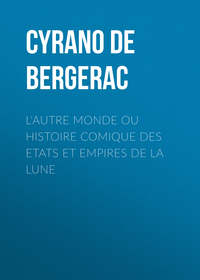 полная версия
полная версияA Voyage to the Moon
75
"It hath its original from much grief.""… On ne s'attendait guèreDe voir [Charon] en cette affaire!"In fact, our translator has made an amusing mistake, for which the printer of the 1661 edition is perhaps partly responsible; in that edition we read: "(Caron ne se sert pas d'autres chandelles)," which should of course be, as in the other editions, "Caron …;" "For they use no other candles."
76
"Your excellency's servant."
77
Domingo Gonzales, the hero of Bishop Francis Godwin's The Man in the Moone (see p. 4, note), who says of himself: "I must acknowledge my Stature is so little, as I think no Man living is less."
78
The engraving opposite, showing how he was carried up by his birds, is copied from an old edition of The Man in the Moone. The other winged figures about him are supposed to represent demons who attacked him when just above "the middle region."
79
With the pure element (Lat., merus); i. e., water alone unmixed with impurities or other elements.
80
Fr. gazouillent, babble.
81
Unfortunate creature ("ce malheureux").
82
The translator has here mistaken a Dative for an Accusative. The sense of the French is: "But we need a Prometheus to pluck out for us, from the bosom of Nature, and make tangible to us, that which I will call First Matter."
83
Ostrich.
84
Starlings.
85
Fr., "sornettes," nonsense.
86
Wrest the facts to fit his theories.
87
Ostrich.
88
Drumming, striking; cf. Nahum ii. 7: "And her maids shall lead her as with the voice of doves, tabouring upon their breasts."
89
Cyrano writes all proper names by musical notation, in imitation of the language of the moon as he has described it.
90
Possibly "field officers" here; in exact ranking, the Maréchal de Camp stands between Colonel and Lieutenant-Général, and corresponds to Brigadier-General.
91
Fencing sword. Cf. Shakspere, Hamlet:
"If he by chance escape your venomed tuck."92
Cf. P. 95, n. 1.
93
Folly, foolishness, ridiculous belief. Cf. Shakspere. Merry Wives of Windsor: "… drove the grossness of the foppery into a received belief."
94
Cf. the saying attributed to Galileo immediately after his public recantation (June 22, 1633): "E pur si muove" – "yet it does move."
95
The people, the populace. Cf. pp. 74 and 168.
96
"Libertinism" in seventeenth-century English is like the French libertinage, applied rather to licentiousness of opinion than of practice; so here it means rather "free thought" than free living.
97
Deference.
98
Cf. Gulliver's Voyage to Lilliput, chap. vi.
99
Respect.
100
Fr., Dieu Foyer. The change seems to be an interesting embroidery of the translator's fancy, since he has correctly translated the words as "Household God" on p. 76.
101
Fr., "sous une pomme de chou" under a cabbage-head; where, as too curious children are sometimes told in France, the babies are found. The English expression is exactly equivalent. Cf. Locke: "Sempronia dug Titus out of the parsley bed, as they used to tell children, and so became his mother."
102
Supported by the State. Cf. p. 34, n. 1.
103
This and the following paragraphs appear to be an anticipation of the microbe theory.
104
Fr., "dont les Séditieux se sont gorgés" – with which the rebels have filled their bellies.
105
Cf. p. 95, n. 1.
106
Part and depart were interchangeable in the seventeenth century. Cf. Shakspere, Two Gentlemen of Verona:
"But now he parted hence ";and, on the other hand, King John:
"Hath willingly departed with a part" (= given up a part).107
Two alike, or all three alike.
108
Two sixes and a one.
109
Wondered at.
110
Notice that the basis of this discussion is the supposition that the visual rays start from the eye.
111
Lucretius.
112
Democritus was the originator of the atomic theory.
113
A lively Spanish dance-measure.
114
Wick (cf. the Standard Dictionary). Some modern French editions have "pelotons de verre," meaning "glass bulbs," but this is evidently a mistake, since the seventeenth-century editions have verres, which is their form, in all cases, for the modern vers. See also the first meaning of peloton in Littré.
115
The incandescent electric light?
116
Cyrano's own work. It is full of interesting matters, including a trip through the country of the Birds, which offers many points of comparison with Gulliver's Voyage to the country of the Houyhnhms. Cyrano finally, under the guidance of Campanella, arrives at the land of the Philosophers of the Sun (compare Swift's Laputa), where he meets Descartes and Gassendi, as Gulliver does in the Laputan province of Glubbdubdrib (Voyage to Laputa, chap. viii.).
Cyrano's machine for reaching the sun, depicted in the illustration opposite, is best described in the words of M. Rostand's play, and completes our parallels with all the six means of scaling the sky which Cyrano there enumerates: "Or else, I could have let the wind into a cedar coffer, then ratified the imprisoned element by means of cunningly adjusted burning glasses, and soared up with it."
117
Probably Campanella; cf. p. 78, n. 1. On his "great work," cf. also p. 79, n. 1.
118
Is this an anticipation of the phonograph?
119
Readings. Cf. Sir Thomas Browne: "In the lecture of Holy Scripture, their apprehensions are commonly confined unto the literal sense of the text."
120
Cf. M. Rostand's Cyrano de Bergerac, act I. scene iv.: "Cyrano. A great nose is properly the index of an affable, kindly, courteous man, witty, liberal, brave, such as I am! and such as you are forevermore precluded from supposing yourself, deplorable rogue!"
121
Vesuvius.
122
Fr., "travaux," i. e., old English Travails.
123
The Manuscript of the Bibliothèque Nationale ends differently: "I enquired at the port when a ship would leave for France. And when I was embarked, my mind ran upon nothing but the Wonders of my Voyage. I admired a thousand times the Providence of God who had set apart these naturally Infidel men in a place by themselves where they could not corrupt his Beloved; and had punished them for their pride by abandoning them to their own self-sufficiency. Likewise I doubt not that he has put off till now the sending of any to preach the Gospel to them, for the very reason that he knew they would receive it ill; and so, hardening their hearts, it would serve but to make them deserve the harsher punishment in the world to come."
This is very likely the original ending of the work as it was circulated in Manuscript between 1649 and 1655. In any case, the particular thrust-and-parry used here is a favorite stroke with the "libertins" of the epoch in their duels against "Les Préjugés." "These are not my opinions and arguments," they say; "Heaven forbid!.. They only express the ideas of my characters which of course I abhor." At the same time the arguments have been stated, which was the object in view. Cyrano has several times used this method already, notably at the end of Chapter xvi.
The ending in the text above, that of all the editions, may have been substituted by Cyrano himself during his last illness.




